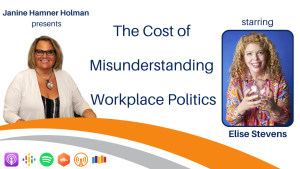 How do you work with office politics and the way organizations communicate without words? Do you want to expand your ability to find satisfaction and success within workplace politics? In this episode, Janine Hamner Holman sits down with Elise Stevens, a career tactician who helps people thrive in the workplace, to discuss the cost of office politics and unspoken culture, and how to navigate that world.
How do you work with office politics and the way organizations communicate without words? Do you want to expand your ability to find satisfaction and success within workplace politics? In this episode, Janine Hamner Holman sits down with Elise Stevens, a career tactician who helps people thrive in the workplace, to discuss the cost of office politics and unspoken culture, and how to navigate that world.
GUEST: Elise Stevens | LinkedIn, YouTube, and Instagram
HOST: Janine Hamner Holman | [email protected] | LinkedIn, Facebook, Instagram
What am I paying attention to today? I had an opportunity yesterday to meet with some CEOs, and we talked about how this little computer that lives in our heads (called our brain) makes up stories. That’s how it sorts information and keeps things in line. The tricky part is when we make up a story and then we live into that story as though it is real.
One of the CEOs with whom I was talking said that several years ago, he was at a networking event and he met another CEO and he was sure she hated him. Every time he would run into her at something, he would avoid her… because he was sure she hated him. About a year ago, she said, as a meeting was breaking up, “Hey Frank, don’t leave because I want to talk to you at the end of this meeting.”
He thought, “Oh sh!#, I’m in trouble. There’s a problem. This is going to be awful.”
Then she said, “I have a client who I think you would be a perfect match for, and I want to put you guys together. For the first meeting I’ll be there so I can smooth the road for you.”
That client became his biggest revenue client.
He had made up this whole scenario in which this woman hated him. But then, she introduced him to his biggest client. She clearly did not hate him, and for two years he lived as though that was true.
I love this idea of how much our brains make up, and how tricky it can be to get out of our own way because we’ve made up all these stories.
With that, I am going to bring in our guest for today. Elise Stevens is a new best friend of mine. She is a career tactician. She helps people thrive in the workplace. She’s an amazing coach and strategist, and she is the person you want to talk to about your career when you’re tired of getting those same old results.
When she and I were talking last, we discussed this idea of how you “read a room.” I am super excited to get to have this conversation today. All the way from Brisbane, Australia, welcome to the show, Elise.
As I often start, tell me, what is something you have become aware of that we’re not paying enough attention to, and what is the cost of that inattention?
Well, I love the topic of your podcast, The Cost of Not Paying Attention, because often people ignore what’s going on regarding politics in organizations and being able to “read the room.” I use “the room” as more general than an actual physical room. What we’re not paying attention to is organizational politics and how they may negatively impact you.

Right?
No one wants to be blindsided by something happening, either being moved out of a role you like or exiting the organization. This leads to stress and a strain on our mental health. Let’s face it, people’s behavior at work is often driven by ego and the pursuit of power. I wish it wasn’t, but it is so true.
Let’s define what we’re talking about first. I found this article talking about how it’s better when we notice cues happening in our workplace. It enables us to better navigate. When you’re thinking about how to “read a room,” is that what you’re thinking of?
Yes, we’re talking about how to engage people, how to understand people, how to be a better influencer, but also how to navigate the tricky world of organizational politics.
When we think about organizational politics, what are the things we want to be paying attention to so we’re better negotiators, so we’re more effective, so we’re getting the buy-in from the people we need to get the buy-in from?
With anything, you have to understand who is involved and who has power. If you’re trying to create change, which is what I do as an organizational change manager, you have to understand which people are going to derail the change.
What are the ways we can improve our attunement to that? Sometimes it’s learning who the CEO or person in power is. Sometimes there are other kinds of influencers and politics going on. How can we get better at being attuned to that?
If you’re new to an organization, the first thing you need to do is pull out the org chart and look and listen. Listen to what people are saying. Listen to people that have worked there for a while when they tell you about who you need to watch out for. Keep an open mind because, when you listen to other people, you’re also bringing their baggage (and yours) along with you.
You need to form your own opinion, but you need to be agile and adaptable in that approach because people aren’t linear. Things go up and down all the time.
You also need to look at some of the internal social media channels like Yammer, Facebook for Business, and Slack to see who is active and what they’re saying. There are some groups within organizations that might be small but have a lot of power. It’s not necessarily the large groups.

You need to map out who has the ear of the CEO. You also might want to learn about the CEO and whether they were an internal hire. If yes, what was their old group? You need to do a lot of market research.
That makes a lot of sense. I want to go back to what you said at the beginning of that. When we think about influencing, we’re looking at “What can I say, what can I do? How can I mold the conversation?”
There’s an article from the Harvard Business Review that talks about the way we pay attention when we are not speaking, the way we want to influence other people, and the nonverbal cues we want to watch for. What are your thoughts about that?
What we’re talking about here is NLP (neuro-linguistic programming). If I talk to someone and I’m not using the same terms as they do, they’re immediately going to think, “What?” If I reframe the conversation and listen to work out the words they use, and then I come back and use those same words, they’re going to think, “Oh, she understands what I’m about, and she’s listening to what I’m saying.”
For example, you have a person who has a thing against the word “test.” If I were to say to them, “I need someone to help with testing doing this,” what’s their immediate response going to be?
They’re going to shut down because you’re using this word they don’t like.
Yes! Instead, I go back and use the word “review,” or “verify.” Then they’re happier because they’re being asked to review, not test, even though it’s the same task.
I love what you were pointing to in talking about when we use the same language as somebody else, when we are “in affinity” with somebody, we often end up mirroring their body language. People who know my mother will often say to me, “Oh my gosh, you look so much like your mom.” I look nothing like my mother. I look a lot like my dad.
They’re noticing our facial expressions and our hand mannerisms. My mother and I are very close, so I do a lot of things like my mother. People make that connection. When we can do that mirroring, it creates that feeling of connection and affinity. We all know people do business with people they like. When we can create that connection with them, we can move things further along.
You also need to listen to clues, in emails or meetings, about how engaged they are with you. Because a lot of organizations, especially here in Australia, they’re not very direct in conversation.
I interviewed a Dutch girl once and she said Australians are so different from the Dutch because the Dutch just come out and say it. Where the Australians, they kind of …
Beat around the bush.
Often it’s not a direct strike, if that makes sense. It’s more likely to escalate as an organizational problem than to be talked about openly. It’s often a larger organizational issue.
While I was prepping for this conversation, I came across an article on a site for parents whose kids have ADHD and/or are on the spectrum. Part of what they were talking about was that a child with ADHD or a child on the spectrum has a hard time understanding body language, tone of voice, facial expressions, and social cues.
I hadn’t thought about this concept of “reading a room” from that perspective. In today’s world, so many of us are realizing we are on the spectrum or, for example, my stepson has ADHD. These things are more and more common. It got me thinking and I’d like to explore it a bit.
What do I do if I know I am somebody who is not naturally good at “reading a room?” If I have a close friend at work, can I ask them to help me figure things out? What are your thoughts on improving this and what are some workaround strategies for “reading the room” if I’m not good at it?
Oh, great question, Janine. Often after a meeting, you’ll debrief with the other people, especially if it’s been quite tumultuous.
Yes. The meeting after the meeting.
Where we debrief with our friends.
If you have trouble reading the room, that’s a great way to do it. With one person, ask, “I thought this, what do you think?” Or “I was having trouble working out what was going on in there. Were people happy?”
That’s a great way to do it, and that’s why it’s really important to have good interpersonal relationships with people you trust.

Also, sometimes people aren’t direct, but I do find people give you verbal and visual clues about what they’re thinking. Often words and actions don’t match. That’s a red flag. I’ll give you an example. I used to work with someone who was a dreadful project manager, and she used to say, “I’m very self-aware.”
I love it when people say that because usually the people who say that are the least self-aware people! It’s so interesting.
So you’re immediately thinking, “You’re not self-aware at all.”
The more outrageous the claim, the more you should believe the opposite. I was in a meeting where people were disagreeing with each other and they were stuck in the cycle of saying “sorry” to each other.
What was actually being said was, “Not sorry at all.”
That’s important in reading the room. Everyone wanted their way, no one was going to back down. In the end, they said, “We’ll have to take this offline.” That’s a good way to deal with it.
You and I both get to work with organizations and help with these issues. When you’re in a situation where people are saying, “Sorry, not sorry,” and being snarky, is it better to stay there and hash it out, or say “I don’t think we’re going to make much progress on this right now. Let’s take a break and come back to this when we next get together.”
How do you help organizations and people navigate through that?
You have to call time on it. The thing is you get sick of hearing the “Sorry, not sorry” over and over. There are other things that need to be accomplished, instead of staying in that unproductive “sorry cycle.”
I found this interesting article in Business Insider. It was talking about how we are often a mover or an opposer, a follower or a bystander, and how we act out of power, meaning, or affect, and we can be closed, open or random.
I found those concepts really interesting about the power dynamics that might be happening inside a conversation. They might not have anything to do with the actual power people have, but sort of the roles we play.
As we’re trying to “read the room” and gauge what’s happening and what we should do, how do we get to the result we’re looking for?
You have to quickly work out the style of the person. Are they truly a facilitator? There are different ways to categorize them. How much of a narcissist are they? What buttons should you avoid pushing? What words can you use with them? It’s a trial by fire.
Right? Because if we get it wrong …
They’ll burn you, baby.
I always have problems with command and control.
I think most of us do. It’s one of the great things about getting to do what you and I get to do at this moment in time. Many organizations are realizing this old command and control structure doesn’t work great for us modern humans. We get to help them figure out how to move into something different.
I’m not seeing any movement.
Really?
Really.
Oh, man.
I don’t know whether it’s just the organizations with which I work, but there’s this disconnect between the lofty HR ideals of being better leaders and what I see playing out. From an operational perspective, these “leaders” will let people do whatever they need to do to get the desired results. Even though there might be some damage to the people, they don’t address it until it suits them. I always find that people’s bad behavior is tolerated… until it isn’t.
When you are working with organizations, what tends to be the tipping point?
When things are escalated to senior management.
If it’s confined to one team, they’ll say, “They’re delivering. I don’t have to do anything.”
Once it expands beyond that team, then they’re more likely to do something. It’s not until someone else rocks the boat that they’ll do something. That’s been my observation.
It’s interesting that I’m in the U.S. and you’re in Australia. There are some organizations here… there is one with which I’ve just started working… and they have been having really significant turnover year over year, 40%, 50% of their staff. I mean, huge numbers.

The CEO knew people were quitting, but when he realized the cost of that transition in hard dollars and intellectual capital walking out the door, he realized he needed to do something.
What are the other triggers you see motivating people to realize, “Okay, we do need to do something about this?”
It is a hard question because I’ve seen so much inactivity with this. I’ve seen some exit interviews from people leaving the organization and writing down what has really gone on. Then HR has, kind of, done something, but not something effective.
Bad behavior, unfortunately, is tolerated until work isn’t being delivered. It’s a shame, but at the end of the day, people will think, “Oh, well, we’re expendable.” The cost of individuals for some “leaders” doesn’t matter. Not everyone, but some.
Certainly, yes. I wonder if the number of people who realize that cost and want to change how they operate is growing. To me, it feels like it is. When I talk with folks at different levels in organizations, there seems to be more of a general understanding of that than there has been in the past.
I hope so.
I hope so too. Of course, that’s a big part of what you and I are both up to in the world. We’re working on creating the understanding that organizations do well when their people do well.
People also have to take more ownership of their own happiness at work.
My personal opinion about happiness is that we’ve gotten this idea wrong. In the U.S. Bill of Rights, the “pursuit of happiness” is part of what we are supposedly up to as a group. In reality, happiness is circumstantial.
Right now as we are having this conversation, I am heartbroken. We had to say goodbye to our beloved dog earlier this week. It’s one of the things that is just awful about having these furry creatures in our lives. If I talk about it for too long, I will well up. I’m not going to do that, but I am not happy. I’m not happy at all.
I am, however, motivated, curious, and ultimately satisfied with my life. I think we’ve collapsed some things when we think that an organization is responsible for our happiness. An organization is responsible for my satisfaction, which is a very different thing because it’s less based on in-the-moment circumstances as I think about it. What do you have to say to all that?
First, I’m sorry to hear about your dog. I’ve lost pets before. There is a transition to get through that grief.
I don’t think there’s a final state of happiness. I think there are a number of factors to being at peace. I’m trying to talk more about how there are some things we can change at work to make us a lot more… I don’t know if “happiness” is the right word.
Content. Powerful.
Yes. Content.
It’s not about promotions and things like that. It’s about doing meaningful work. It’s about being respected and giving respect to everyone around us. It’s about having that sense of fulfillment and contributing to something you enjoy.
It’s an intellectual thing for some people. There are so many different factors, but I see so many people who are grumpy at work, and they push all that responsibility back onto the organization. In reality, it’s their responsibility.
To resolve and to get in the moment. Because if work’s not working for you then you need to do something about it. There are very few of us that are financially stable enough to quit. If something’s not working for you, then you get to make a change.
That manager I spoke of earlier who said she was self-aware, she is really toxic, and yet the organization chose to do nothing about it. Eventually, they did because a higher-up person complained.
I once had a boss scream at me, “ You know nothing about people.” I wanted to say, “If I know one thing, it’s people!”
That boss was not self-aware and was very toxic. Eventually, something was done about him, and I made a conscious choice, “I am not invested enough in this organization to try and do anything about that. What I’m going to do is find a new job.” Which I did and I left.

If people find themselves in that situation, you, Elise, are one of the people who can coach them. You help people not only think about how to be happier in their careers but also sometimes think about making a change.
That’s the big thing, isn’t it? When you’re unhappy at work, what are you going to do? You’re going to go home and take it out on your family. You are going to have a s*!t life. Your health is going to be impacted, and your stress levels will go up. You’re not going to enjoy life. All because some person at work is making your life difficult. You’ve got a choice to be unhappy or happier; it’s your choice to do something.
Or make a different choice and get the heck out.
Yes. That’s right.
Elise, this has been wonderful. Is there anything you wanted to talk about today that you haven’t yet?
I want to go back and say listen more. People often tell you what they’re thinking, and the more random it seems, the more you have to listen, if that makes sense. If someone says something to you out of context and you can’t make sense of it, remember it because it’s going to make sense down the road. They’re giving you a heads-up about what they’re planning to do and how it might impact you.
I know that sounds cryptic, but I’ve had people say odd things to me, and then months later it all came together.
I have a mentor, Alison Armstrong, who often says, people will tell you who they are. You need to believe them.
We want people to be different, and we create this different story about who they are, and then we live into that story as though it’s real. When information comes in that doesn’t fit that story, we let that information go. It would, rather, be in our best interest to keep that information!
What we get to do is listen and pay attention and notice what they’re really saying and revealing, and then live into that.
This has been a wonderful conversation. Thank you so much again for being up with us early on a Saturday morning in Australia. Elise Stevens, you are a treasure, and I so appreciate you. Thank you so much.
Thank you, Janine. I always enjoy talking with you.
I am Janine Hamner Holman, and this has been The Cost of Not Paying Attention. Remember, great leaders make great teams. Until next time.
Important Links
Harvard Business Review – Reading The Room
Business Insider – How the Most Effective People Learn To Read A Room
About Elise Stevens
Elise Stevens is a career tactician who has been helping people thrive in the workplace. She also works as an organizational change manager. Her passion lies in helping people find success and satisfaction in their careers.
Elise is the person to talk to when you need unique solutions to your career questions and concerns. When you know what your goals are but you don’t know how to achieve them, Elise gives you the steps to make it happen.
Whether you’re looking for a career change, a promotion, or you want to start your home business, Elise has the skills and know-how to help you along. She has faced career issues herself that gave her insight into what people really need to excel and find happiness.






